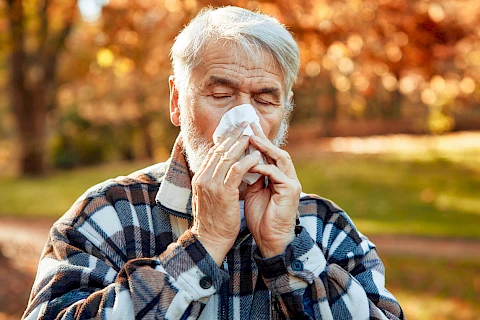
Fall can be a beautiful time of year, but it can also be challenging for seniors with allergies. The changing season brings a host of allergens that can affect the health and comfort of your elderly loved ones. From reducing allergen exposure to working with healthcare providers, managing senior allergies in the fall can make a big difference in helping them enjoy the season.
Common Fall Allergens
Fall can bring more than just cooler weather. It can also trigger allergies for seniors as common allergens become more prevalent.
Ragweed Pollen
Ragweed pollen typically peaks from late summer to early fall. Even a small amount can trigger allergic reactions in sensitive individuals. It can cause itchy eyes, runny noses, and even respiratory issues for seniors.
Mold Spores
Mold spores thrive in the cool and damp conditions that fall often brings. They can be found indoors and outdoors, especially in piles of wet leaves or in moisture-prone areas of the home. These allergens can cause nasal congestion, coughing, and wheezing, particularly troubling seniors with weaker immune systems.
Dust Mites
While dust mites are present year-round, they can become more bothersome in fall when homes are closed to keep out the cold. These tiny creatures thrive in warm, humid environments. Dust mites can cause symptoms like sneezing, coughing, and itchy skin.
Pet Dander
As families spend more time indoors during the cooler months, exposure to pet dander can increase. Pet dander is a common allergen that can aggravate allergy symptoms in older adults. Exposure to pet dander can lead to sneezing, coughing, and respiratory discomfort.
Strategies for Minimizing Allergen Exposure
To reduce allergen exposure, maintain good indoor air quality by using air purifiers in key rooms like the bedroom and living room. Clean and dust surfaces regularly to reduce the accumulation of dust mites and mold spores. Create a more comfortable environment for seniors sensitive to allergens by establishing pet-free zones within the home, especially in sleeping areas.
Check local pollen counts daily to plan outdoor activities with seniors to minimize exposure. Encourage them to stay indoors when pollen levels are high, particularly in the morning and early afternoon. Ensure they change clothes immediately after coming inside to remove any pollen or mold spores. Have seniors shower before bedtime to wash away lingering allergens and ensure a more restful sleep.
Working With Healthcare Providers
Regular check-ups are integral in managing allergies effectively. These visits allow healthcare providers to monitor symptoms and adjust treatment plans. Prepare a list of questions or observations about changes in the senior's condition so healthcare providers can tailor treatment plans. Keep a symptom diary to track when and where symptoms occur and their severity to identify triggers.
Various medications can help manage allergy symptoms. Over-the-counter options like antihistamines and decongestants can be effective for mild symptoms. However, a healthcare provider may recommend prescription treatments for more severe or persistent symptoms based on individual needs.
Need In-Home Support for a Senior Struggling With Fall Allergies?
Caring for a senior loved one can be extra challenging in the fall, especially if they have seasonal allergies. If you need support in managing their care, Senior Helpers Central Valley North can help. Our services cover everything from routine and medication reminders to assistance with daily living activities, light housekeeping, and more. If you’re in Fresno, Madera, Los Banos, Sanger, and Atwater, contact us today for more information!